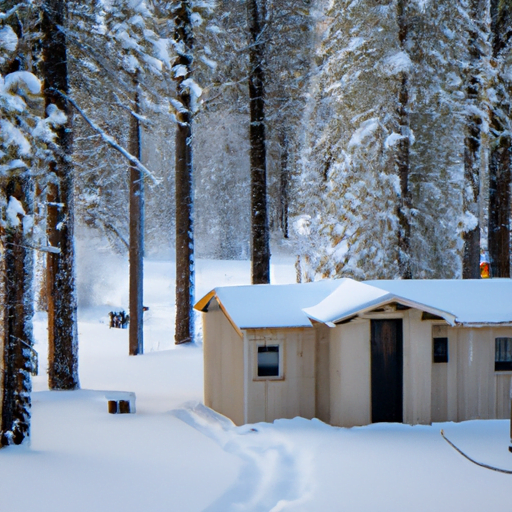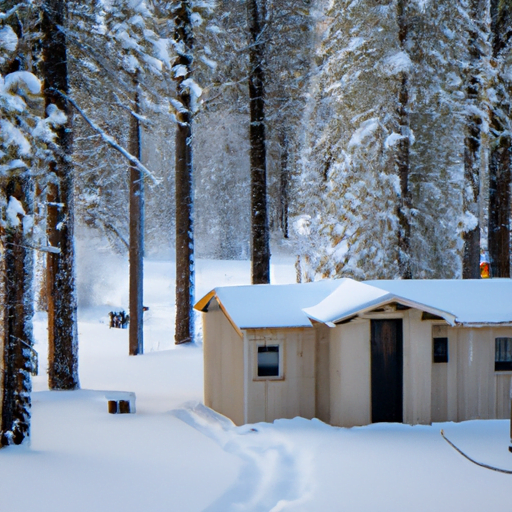So, you’ve decided to go off-grid and embrace the self-sustainable lifestyle. That’s awesome! But now you’re faced with the challenge of figuring out the best heating system for your off-grid home. Trust me, I’ve been down that road before, and I know it can be overwhelming. But don’t worry, I’m here to help you navigate through the options and find the perfect heating solution for your off-grid paradise.
When it comes to off-grid living, one of the most important considerations is energy efficiency. You want a heating system that can keep you warm without draining your power supply. There are various options to choose from, such as wood stoves, propane heaters, and even solar-powered systems. Each has its pros and cons, and it depends on factors like your location, climate, and personal preferences.
In the upcoming article, we’ll dive deep into the world of off-grid heating systems. We’ll explore the different options available and discuss their advantages and disadvantages. Whether you’re looking for a system that maximizes energy efficiency or one that is cost-effective, you’ll find valuable insights to help you make an informed decision. So, get ready to learn more about the best off-grid heating systems and take a step closer to achieving your self-sustainable dream.

Off-Grid Living
Living off-grid has become an increasingly popular choice for many people seeking a self-sustainable and eco-friendly lifestyle. This lifestyle involves disconnecting from the traditional power grid and relying on alternative energy sources for electricity, water supply, and heating. While off-grid living offers various benefits, it also presents its fair share of challenges. In this article, we will explore the best off-grid heating systems and discuss the factors to consider when choosing the most suitable option for your off-grid lifestyle.
Benefits of Off-Grid Living
Off-grid living offers numerous benefits, making it an attractive choice for those seeking a more sustainable and independent way of life. Here are some key benefits:
Energy Independence: By living off-grid, you become self-reliant when it comes to energy production. You are not bound by the limitations and fluctuating costs of traditional utilities.
Lower Energy Costs: With the proper setup, off-grid living can significantly reduce your energy costs over time. By harnessing renewable energy sources, you remove the need to pay for traditional electricity.
Environmentally Friendly: Off-grid living promotes sustainability and reduces your carbon footprint. It allows you to utilize renewable energy sources, which helps combat climate change.
Closer Connection to Nature: Living off-grid often involves being surrounded by natural landscapes, allowing you to immerse yourself in the beauty of nature and enjoy a peaceful existence.
Challenges of Off-Grid Living
While off-grid living can be rewarding, it also comes with its own set of challenges. These challenges should be considered before embracing this lifestyle:
Initial Setup Costs: Setting up an off-grid system can require a significant initial investment. The cost of purchasing and installing the necessary equipment, such as solar panels or a heating system, can be substantial.
Limited Resources: Living off-grid means relying on limited resources, such as water and fuel. Managing and conserving these resources efficiently can be a challenge, especially during extreme weather conditions or in remote locations.
Maintenance and Repairs: Off-grid systems require regular maintenance and occasional repairs. This can be more challenging compared to traditional systems since professional help may not be readily available in remote areas.
What is Off-Grid Heating System?
An off-grid heating system is a method of heating a home or building without relying on the traditional power grid. These systems utilize alternative energy sources to generate heat, ensuring warmth and comfort even in the absence of conventional utilities.
Definition of Off-Grid Heating System
Off-grid heating systems are designed to operate independently of the traditional power grid, making them suitable for off-grid living situations. These systems typically rely on renewable energy sources, such as solar power, biomass, geothermal energy, wood, propane, or pellet stoves, to provide heating.
Importance of Off-Grid Heating System
In off-grid living situations, having a reliable heating system is crucial for maintaining a comfortable living environment. An efficient off-grid heating system ensures warmth during colder months and allows for a more sustainable approach to heating without relying on fossil fuels or grid-based energy sources.
Factors to Consider in Choosing the Best Off-Grid Heating System
When selecting the best off-grid heating system for your needs, several factors should be taken into consideration. These factors will help determine the most suitable heating option for your specific off-grid living situation. Here are three essential factors to consider:
Energy Efficiency
Choosing an off-grid heating system with high energy efficiency is important to optimize the use of limited resources. Energy-efficient systems will minimize energy waste while providing sufficient heat output for your space. Look for systems with high energy efficiency ratings and smart control features that allow for precise temperature regulation.
Fuel Availability
Consider the availability and accessibility of the fuel required for your chosen off-grid heating system. If you’re in a remote area, it’s essential to ensure that the fuel source is readily available and can be easily replenished. This will prevent interruptions in heating during the colder months.
Installation and Maintenance Costs
Take into account the initial installation costs and the long-term maintenance expenses. Off-grid heating systems may require specialized installation and periodic maintenance to ensure optimal performance. Be sure to factor in these costs when selecting the most suitable heating system for your off-grid lifestyle.

1. Solar Heating System
How Does Solar Heating System Work?
A solar heating system utilizes the sun’s energy to generate heat for your off-grid heating needs. It typically consists of solar panels that capture the sunlight and convert it into usable energy. This energy is then used to heat water or air, which is circulated throughout the space to provide warmth.
Advantages of Solar Heating System
- Solar heating systems are environmentally friendly, as they rely on renewable energy.
- They have low operating costs, as sunlight is free and abundant.
- Solar heating systems have minimal maintenance requirements, reducing long-term expenses.
Disadvantages of Solar Heating System
- Solar heating systems are dependent on sunlight, so their efficiency may be reduced during cloudy or winter months.
- Initial installation costs can be relatively high, depending on the size of the system and individual energy needs.
2. Biomass Heating System
How Does Biomass Heating System Work?
A biomass heating system utilizes organic materials, such as wood pellets, logs, or agricultural waste, to generate heat. These materials are burned in a biomass boiler or stove, releasing heat energy that can be used for heating water or space.
Advantages of Biomass Heating System
- Biomass heating systems provide a sustainable heating solution, as biomass fuels are renewable and carbon-neutral.
- Biomass fuels are often locally available, reducing reliance on fossil fuels and lowering transportation costs.
- Biomass heating systems can be sustainable and cost-effective for heating larger spaces or multiple buildings.
Disadvantages of Biomass Heating System
- Biomass heating systems require proper storage space for fuel and regular maintenance to ensure efficient operation.
- The combustion process may produce emissions, such as smoke and particulate matter, requiring appropriate ventilation and cleaning.
3. Geothermal Heating System
How Does Geothermal Heating System Work?
A geothermal heating system utilizes the heat stored beneath the Earth’s surface to provide heating for your off-grid home or building. This heat is accessed through a series of pipes buried underground, which circulate a heat transfer fluid. This fluid absorbs the heat from the earth and transfers it to a heat pump, which then disperses the heat throughout the space.
Advantages of Geothermal Heating System
- Geothermal heating systems are highly efficient and can provide consistent heating throughout the year.
- They have low operational costs, as they rely on the steady temperature of the earth.
- Geothermal heating systems have a long lifespan and require minimal maintenance.
Disadvantages of Geothermal Heating System
- The initial installation costs of geothermal heating systems can be higher compared to other off-grid heating options, due to the excavation and installation of underground loops.
- Geothermal systems are more suitable for areas with access to a consistent water source, such as a well.
4. Wood Stove Heating System
How Does Wood Stove Heating System Work?
A wood stove heating system utilizes the combustion of wood to generate heat, which is then circulated throughout the space through a stovepipe or ductwork. Wood is burned in a stove or fireplace, with the heat radiating into the room.
Advantages of Wood Stove Heating System
- Wood is a renewable and widely available fuel source, making wood stoves a sustainable heating option.
- Wood stoves are relatively affordable and can be installed in various sizes and designs to suit different spaces.
- Wood stove heating systems provide a cozy and traditional ambiance, enhancing the overall experience of off-grid living.
Disadvantages of Wood Stove Heating System
- Wood stoves require regular maintenance, including cleaning, ash removal, and chimney inspections, to ensure safe and efficient operation.
- They produce emissions, such as smoke and particulate matter, which may require ventilation and compliance with local regulations.
5. Propane Heating System
How Does Propane Heating System Work?
A propane heating system utilizes propane gas as a fuel source to generate heat. Propane is burned in a furnace or boiler, with the heat distributed through a network of ducts or radiators to provide heating.
Advantages of Propane Heating System
- Propane is a clean-burning fuel with lower greenhouse gas emissions compared to other fossil fuels.
- Propane heating systems can provide efficient and reliable heating, even in colder climates.
- Propane is widely available in most areas and can be easily replenished, making it suitable for off-grid living.
Disadvantages of Propane Heating System
- The cost of propane can fluctuate, potentially affecting the long-term operational expenses.
- Propane heating systems require regular maintenance, including tank inspections and safety checks, to ensure proper function.
6. Pellet Stove Heating System
How Does Pellet Stove Heating System Work?
A pellet stove heating system uses pellets made from compressed wood or biomass as the fuel source. Pellets are fed into a hopper, where they are automatically fed into a combustion chamber. The combustion process generates heat, which is then circulated throughout the space with a blower or convection system.
Advantages of Pellet Stove Heating System
- Pellets are a renewable and readily available fuel source, making pellet stoves environmentally friendly.
- Pellet stoves are highly efficient and provide consistent heat output, ensuring a comfortable living environment.
- Pellet stoves offer automated features, such as programmable timers and thermostatic controls, for convenient operation.
Disadvantages of Pellet Stove Heating System
- Pellet stoves require regular maintenance, including ash removal and cleaning, to maintain efficient performance.
- The cost of pellets may vary depending on location and availability, which can impact operational expenses.
Conclusion
In conclusion, choosing the best off-grid heating system for your off-grid lifestyle requires careful consideration of various factors. Factors such as energy efficiency, fuel availability, and installation and maintenance costs should be assessed to ensure the most suitable option for your needs. Solar heating systems, biomass heating systems, geothermal heating systems, wood stoves, propane heating systems, and pellet stoves are all viable choices, each with its own advantages and disadvantages. By exploring these different options, you can make an informed decision and embrace an off-grid lifestyle while enjoying sustainable and efficient heating solutions.




